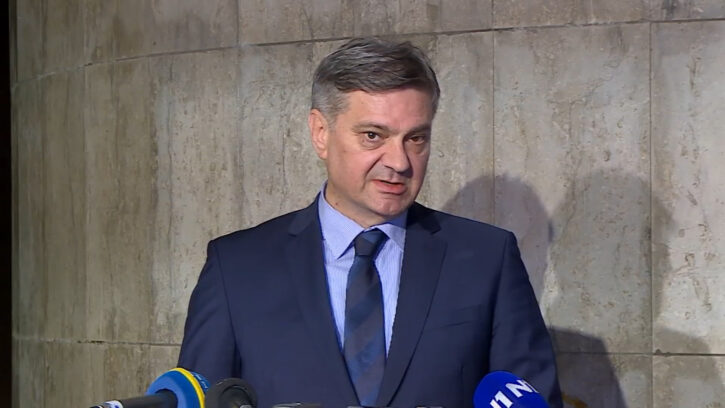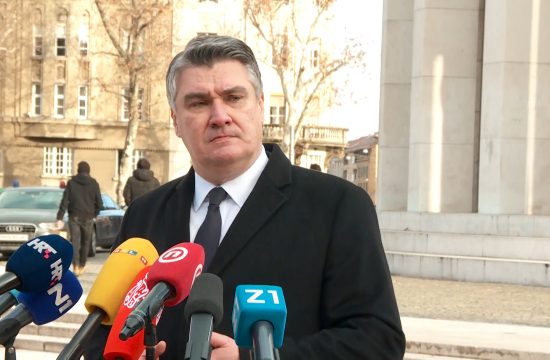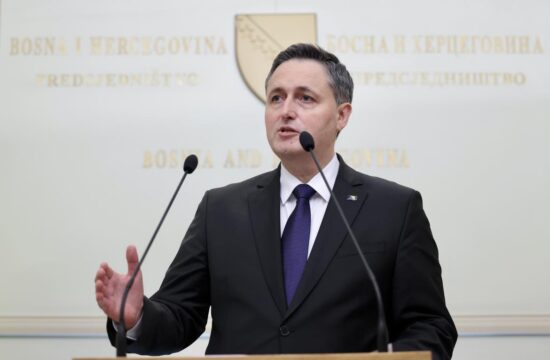
Representatives of Bosnia’s ruling ethnic parties interpreted a document the three Presidency members agreed to be sent to NATO completely differently on Wednesday, with a top official of the main Bosniak party saying that it implies the continuation of Bosnia’s NATO membership path while a spokesperson of the ruling Bosnian Serb party said it does not predict that.
Bosnia’s previous ministers continued to serve the posts in a technical mandate for more than a year since the Bosniak and Croat members of the tripartite Presidency, Sefik Dzaferovic and Zeljko Komsic, respectively, refused to approve the appointment of the new Chairman of the Council of Ministers – a member of the party led by their Serb colleague in the Presidency, Milorad Dodik.
The reason was a disagreement over whether Bosnia should send the Annual National Programme (ANP) to NATO, which would activate the country’s Membership Action Plan (MAP) and would represent the next step on the path to membership in the alliance.
NATO remains unpopular with Serbs in both Serbia and in Bosnia's Serb-majority semi-autonomous entity of Republika Srpska (RS) since the alliance launched airstrikes against the Bosnian Serbs during the 1992-95 Bosnian war and against the Serbian military in 1999 during the conflict between Belgrade and ethnic Albanians in Kosovo.
Although it agreed to Bosnia joining NATO about a decade ago, Dodik’s Alliance of Independent Social Democrats (SNSD) changed its mind in recent years and refused to let the country make any step toward NATO membership. In line with neighbouring Serbia, the Serb-majority part of Bosnia, Republika Srpska (RS), adopted a Resolution on Military Neutrality in 2017, which means it opposes membership in any military alliances.
Komsic and Dzaferovic insisted that they will not approve the appointment of the SNSD’s Zoran Tegeltija unless the ANP is sent to the NATO headquarters in Brussels, arguing that Bosnia is obligated to do so by earlier decisions and the law.
On Tuesday, the Presidency members agreed to approve the appointment of Tegeltija and all other new ministers. They also agreed that Bosnia will send ‘a document’ to NATO, without ever mentioning the word ‘ANP’.
According to the still-acting Chairman of the Council of Ministers is Denis Zvizdic, who is along with Dzaferovic a member of the ruling Bosniak Party for Democratic Action (SDA), the document implies Bosnia’s future integration in NATO.
“The Presidency sent a document which is acceptable for NATO and it will mean the activation of the Membership Action Plan,” Zvizdic said on Wednesday, adding that “this is what we have been waiting for, wishing for, and what will resolve and unblock processes.”
The spokesperson of Dodik’s SNSD, Radovan Kovacevic, also said on Wednesday that the document represents a success, but he argued that it means the complete opposite.
“We managed to push both the representatives of the Bosniak and Croat peoples to accept it. Now we, for the first time, have a document which everyone has accepted and which clearly states that NATO membership is not predicted,” he said, adding that “this is a huge success for Republika Srpska, the SNSD and Dodik,” he said.








